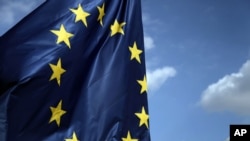Serbia has taken an “irreversible” step towards European Union membership, with the first two chapters of accession talks between the bloc and the former Yugoslav nation opening in Brussels.
Analysts say the opening of EU talks Tuesday is a reward for Belgrade’s cooperation in normalizing bilateral relations with Kosovo and handing over suspected war criminals.
Initial discussions on Serbia’s EU entry began roughly two years ago.
London School of Economics and Political Science Senior Research Fellow James Ker-Lindsay says the talks mark the end of a long preliminary stage to European membership.
"Now we really get into the hard and fast business of starting to transform Serbia. This is when the real process of all those aspects of day-to-day life, which the country has got to change in order to ready itself for membership of the European Union comes under scrutiny," said Ker-Lindsay.
The talks focus on EU financial control regulations and Serbia's relations with Kosovo, an issue Global Risk Insights analyst Robert Ledger says is more likely to impede the process.
"The main thing is the normalization of its relationship with Kosovo; that is a very thorny for both sides," said Ledger.
Kosovo broke away from Serbia during the Kosovo War in 1999 and declared independence in 2008. Belgrade refuses to recognize Kosovo’s sovereignty, but has made concessions in return for autonomy for Serbian municipalities in the territory.
Serbian Prime Minister Aleksandar Vucic insists the issue will not stand in the way of integration, affirming: “Serbia belongs in Europe.”
But not everyone in the Balkan state agrees. European membership should bring economic benefits, but a general perception among Serbians is they will be less than the government claims, particularly when looking at the experience of former Yugoslav republics Slovenia and Croatia.
Kingston University Associate Professor Marko Hoare says the country is divided by liberal and nationalist currents.
"The liberals see themselves as Europeans and want to develop along liberal, democratic Western lines, and nationalists see the West as an enemy, which bombed Serbia in 1999 and which allegedly broke up Yugoslavia. They believe you lose your culture if you join the European Union, and they object to things like gay rights and minority rights," said Hoare.
Europe has always seen the Balkans as a strategic objective, particularly Serbia, which has been a traditional ally of Moscow.
Russia has not publicly condemned Serbia’s EU plans.
"Some would say that perhaps Russia would like to have a friendly country like Serbia inside. It would potentially be almost a way of having your own man in the other side’s camp," said Hoare.
Moscow’s concern appears to be NATO expansion, referring to an invitation by the military alliance to Montenegro earlier this month as an “openly confrontational step.”
Serbia says it has no intention of becoming a NATO member, and recently insisted it would remain militarily neutral if joining the European Union.
But IHS Country Risk Analyst Dijedon Imeri believes neutrality will become exceedingly arduous as Serbia advances towards full European integration.
"It is going to be difficult to balance this out in the longer term, and it also depends how things unfold in Eastern Ukraine and Russia’s involvement in that area. If Russia continues along this path it will be increasingly unsustainable for Serbia to keep this ambivalent position in its foreign policy, so it will have to make a choice eventually," said Imeri.
Serbia has announced plans to complete all EU-related reforms before 2019, but most analysts predict the country will join the bloc sometime between 2020 and 2025.
Separately, EU negotiators in Brussels revived Turkey's membership bid, more than a year after EU chief executive Jean-Claude Juncker said the union needed to reevaluate its push toward expansion.
Analysts say Turkey is facing a steep climb in its pursuit of EU membership, particularly on issues of human rights and rule of law.
In a report on Turkey last month, the European Commission called on President Recep Tayyip Erdogan to lift restrictions on media freedoms and boost human rights protections.





